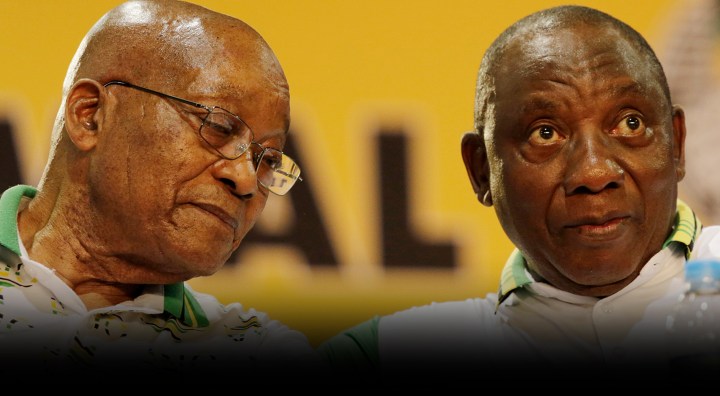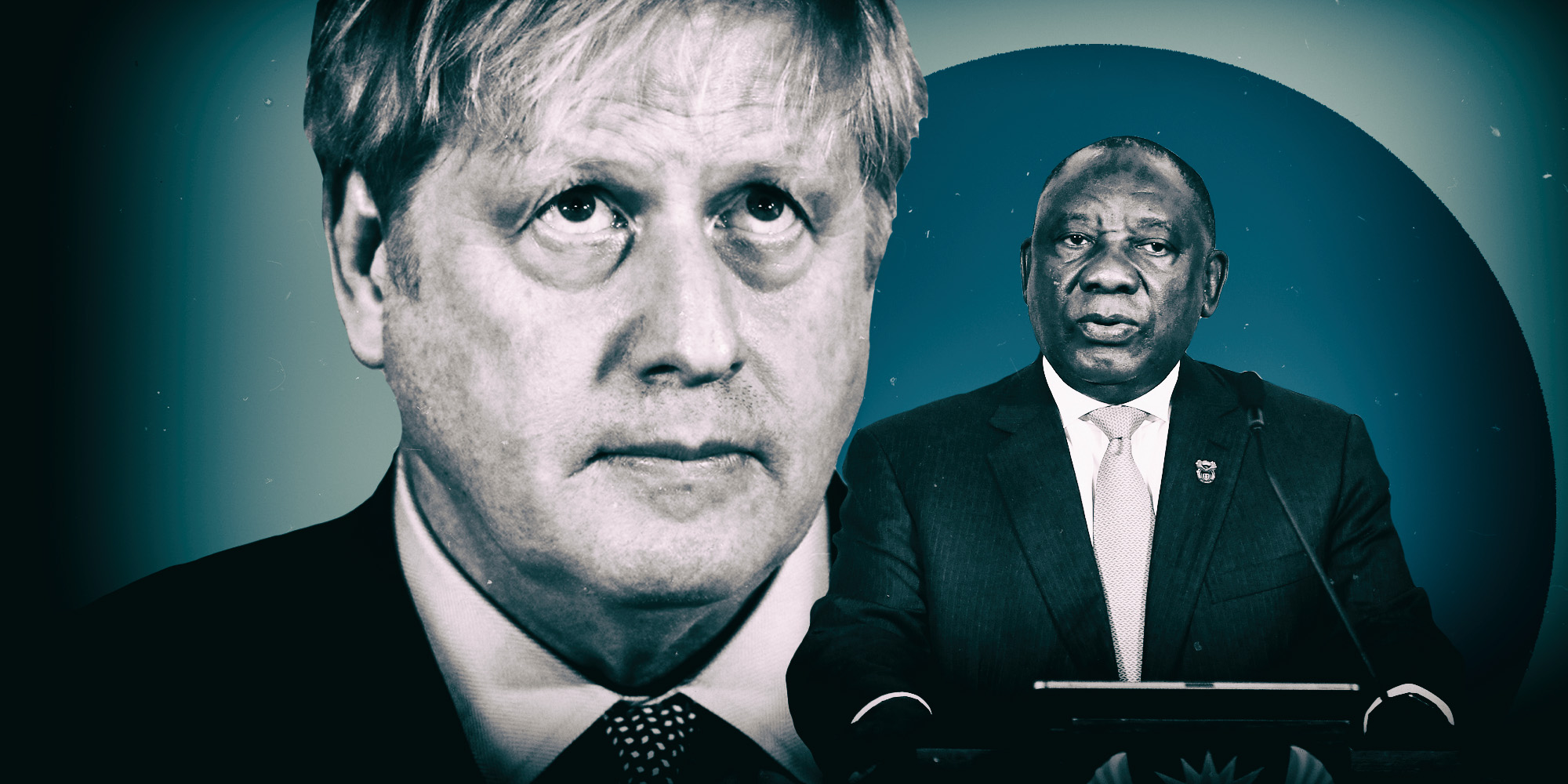REFLECTION
Thank God it’s not Jacob (or Donald or Boris)

There are some leaders self-immolating in the time of Covid-19 and some who are doing a great job of leading their countries in the worst global crisis in a century. President Cyril Ramaphosa is in the camp of leaders showing mettle and deep humanity. In addition, his strong words against the corruption of emergency procurement systems reveal that a different ethic now rules in South Africa. Will it work?
I don’t know about you, but I’ve been having coronavirus and Covid-19 nightmares. Charts and projections about the viral path loop their way into my dreams and my 89-year-old mom looms large because oldies are so at risk. On Saturday I woke up in a start and the first thoughts were these: “Thank God it’s not Jacob” – that’s former president Jacob Zuma and “Thank Allah Ayesha is strong” – that’s my mom. I’m not a journalist given to calling leaders by their first names, although I do call my mom by hers. When I write, it’s always about “former president Jacob Zuma”. And I want the floor to swallow me when journalists refer to the current leader Cyril as if he’s their buddy. He’s not and journalistic distance is a vital asset for our craft.
But that was my waking thought and I’ve thought about why that was. The years of the Zuma administration provided pointers where we would be now if Covid-19 had hit in that time or if the logic of that era (error) defined how South Africa responded. We would be in serious trouble whereas the crisis now feels as if it is being managed with astuteness and leadership that South Africa has not recently experienced.
Why is this? Take one example: the state and the state-owned enterprises are big buyers in the economy. State Capture happened at the nexus of purchase through tenders by private interests. That, in turn, is how the fiscus was bankrupted and why the economic stimulus package is so small (together with private sector contributions it is still under R15-billion compared with, say, Eskom’s debt now almost at R500-billion). Now, to get us through the country’s biggest crisis in the democratic era, the government is going to rely on emergency procurement to buy goods and services for the health system and for the vulnerable. Water trucks are being lined up to ensure enough water in informal settlements and in cities and towns where the infrastructure has collapsed.
Imagine if this happened in the era of State Capture? Patronage networks run by the Gupta family and by the African Global Operations (Bosasa) group of companies would have that market cornered because their cronies would still be positioned in the procurement departments of government departments and state-owned companies. Covid-19 would be an opportunity to loot not an existential crisis to be managed. How this system worked has been revealed repeatedly at the Zondo commission of inquiry into State Capture where it has been shown how the ANC-led government by Zuma was a big looting machine at all levels of the state, in its state-owned enterprises and its government entities.
The state was completely repurposed for corruption or capture and it is one reason that an all-of-society response to the virus is necessary – the state and government alone cannot do it alone as the state’s simply not capable.
Ramaphosa knows the dangers that corruption poses to his success at managing South Africa out of the Covid-19 death curve and toward a scenario that more closely replicates the best examples in the world. Ramaphosa and his team have studied China (about to come out of the viral charts by reopening the epicentre of Wuhan early in April), Singapore (leveraging skills, lock-downs and close management and leadership from the front by prime minister Lee Hsien Loong) and South Korea which pioneered the model of “test, test, test” to become the world’s leaders in managing down the level and scale of infection.
The President has placed the Solidarity Fund (to channel support to the most vulnerable South Africans) outside the state with an independent executive and board to oversee it and the R2-billion in small business support from the Rupert and Oppenheimer families will both be managed by outside agencies. In addition, Ramaphosa had strong words for those who will try to play the fandango with the emergency procurement funds.
“I want to make it clear that we expect all South Africans to act in the interest of the South African nation and not in their own selfish interests. We will, therefore, act very strongly against any attempts at corruption and profiteering from this crisis. I have directed that special units of the NPA (National Prosecuting Authority) be put together to act immediately and arrest those against whom we find evidence of corruption. We will work with the judiciary to expedite cases against implicated persons and make sure the guilty go to jail,” said Ramaphosa in language unusually sharp for his style.
Pragmatism over ideology
Ramaphosa’s 19 steps (see graphic) announced on Monday, 23 March 2020 were widely welcomed by South Africans for covering the bases of protecting lives (by locking down for three weeks by using the army) and for going far to protect livelihoods for the most vulnerable (through the Solidarity Fund, the identification of shelters), for workers (through tax relief, the use of the Competition laws, the UIF and Compensation Funds) and for vulnerable companies (through the contributions by the billionaire Rupert and Oppenheimer families as well as the use of the Industrial Development Corporation, among others.

When the Department of Small Business tried to play politics by making its R500-million support for small businesses contingent on a company being majority (51% black-owned), Minister Khumbudzo Ntshavheni said her staff who had put the clause into early application material. This material then got onto the Net, went viral and created a near race crisis in a time that required unity. In her press briefing on Tuesday, 24 March 2020, Ntshavheni said it was “fake news although it is clear that her bureaucrats tried to put a race-card into the support pie. It signals a pragmatism and understanding that would not have been possible under Zuma’s administration when black empowerment was used to mask patronage and looting by cronies at all intersections where citizens needed state support.
The gratitude that Covid-19 arrived in an era of reform rather than of State Capture could go on. The SABC, for example, is doing a great job of public service broadcasting. With an audience of millions, the SABC is the most vital media in a public health emergency and its journalists are energetic and professional. What if former COO Hlaudi Motsoeneng, the most dire of the Zuma deployees, had been in charge? It’s not inconceivable that he would have commandeered the airwaves to give voice to the evangelists who deny the Covid-19 danger and instead advocate gathering as a way of salvation.
At SAA, it is likely that the President’s friend and patron Dudu Myeni would still have been chairperson at a time when aviation management was at its most precarious ever. At Eskom, would the cronyist Ben Ngubane still be the chairperson and Brian Molefe the CEO and would the lights be on? It is a precarious time, but South Africa is well-led. For the first time ever, the Cabinet is responsive, clear and frank about the challenges they face as the series of briefings by Ministers in the past 10 days have shown. And it is all being done cognisant of the rule of law – regulations are being passed (and passed quickly) to govern the lockdown that will run to April 16 2020 and there is a rare clarity and speed from the entire executive. If there is one glimmer of light at the end of the Covid-19 tunnel it is that this is how government might be run in future.
Cyril is no Donald or Boris
The US President Donald Trump has been his worst and most dangerous self through the Covid-19 outbreak in the US. He has gainsaid his scientists and been a lone ranger. On Tuesday, March 23 2020, it was revealed that a man had died after ingesting too much chloroquine, the drug Trump has marketed as a cure and he tried to colonise a vaccine with potential for US use alone. There is lots more madness while across the pond in the UK, Boris Johnson dilly-dallied with the idea of herd immunity (to peak an infection and create immunity) before being put on the right path.

Illustrative image | sources: South African President Cyril Ramaphosa. (Photo: Felix Dlangamandla) / British Prime Minister Boris Johnson. (Photo: Gallo Images/Simon Dawson/Pool)
Instead, Ramaphosa falls into the camp of what writer Viv Groskop called “the helpers” in an article in the Financial Times this week. In Norway and Denmark, the prime ministers Erna Solberg and Mette Frederiksen have led initiatives that have won kudos and both also held press conferences for and with children to answer their questions in these strange times. In New Zealand, Jacinda Ardern has been a beacon of good leadership as has the German Chancellor Angela Merkel who is still exercising solidarity even as the numbers of infections and deaths in that country climb.
Ramaphosa is now firmly in this camp both in the world and in Africa for the speed of his responses and for taking global lessons to try valiantly to keep South Africa ahead of the curve. In that, he has watched what Rwandan President Paul Kagame has done. In Rwanda, Kagame shut down and then locked down even before a first infection was recorded. It may well be that the crisis of Covid-19 offers South African an opportunity to put the era of State Capture behind it. DM
"Information pertaining to Covid-19, vaccines, how to control the spread of the virus and potential treatments is ever-changing. Under the South African Disaster Management Act Regulation 11(5)(c) it is prohibited to publish information through any medium with the intention to deceive people on government measures to address COVID-19. We are therefore disabling the comment section on this article in order to protect both the commenting member and ourselves from potential liability. Should you have additional information that you think we should know, please email [email protected]"



 Become an Insider
Become an Insider